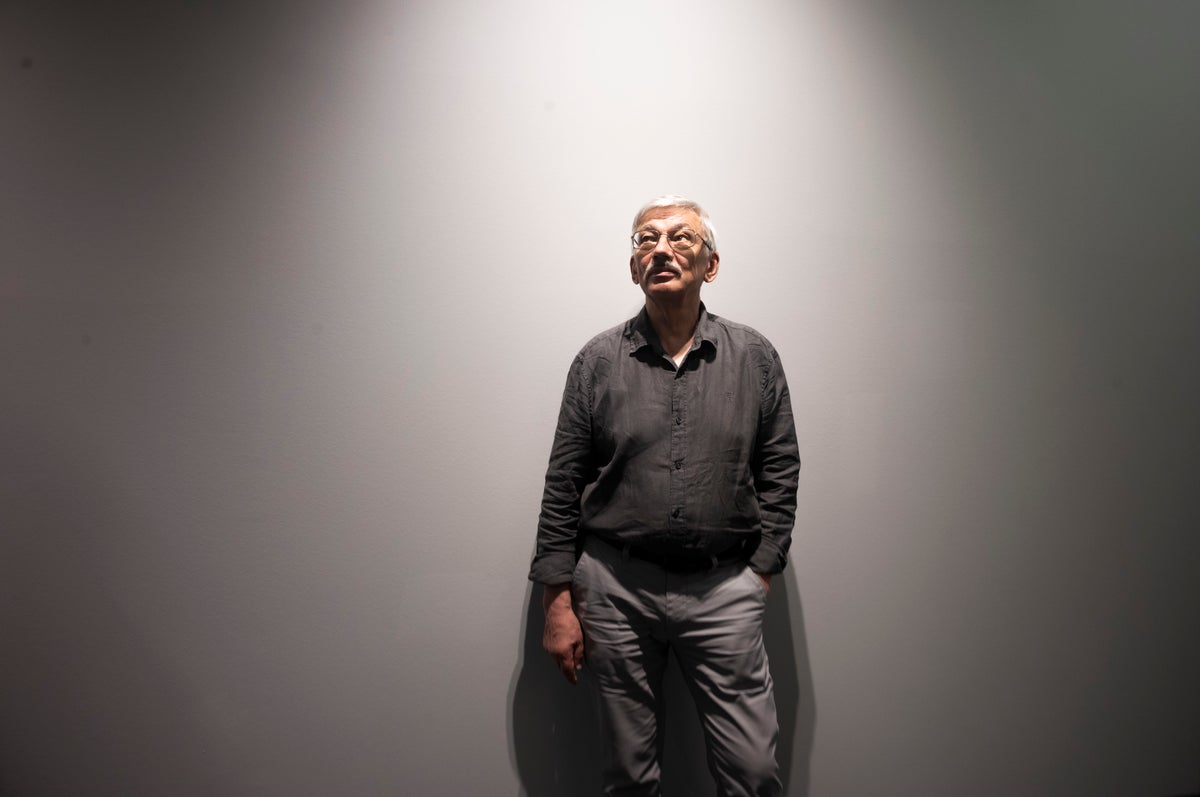
Support truly
independent journalism
A human rights activist since the 1980s, Oleg Orlov thought Russia had turned a corner when the Soviet Union collapsed and a democratically elected president became leader.
But then Vladimir Putin rose to power, crushing dissent and launching a full-scale invasion of Ukraine. Finally, the 71-year-old was himself thrown in prison for opposing the war. Freed last week in the largest East-West prisoner swap since the Cold War, he was forced into exile – just like the Soviet dissidents of his youth.
In an interview with The Associated Press on Thursday in Berlin, Mr Orlov decried the scale and severity of repressions under Mr Putin, with people imprisoned for merely criticizing the authorities, something unseen since the days of dictator Josef Stalin.
And he's vowing to continue his work to free the many political prisoners in Russia and keep their names in the spotlight.
“We’re sliding somewhere into Stalin times,” said Mr Orlov, who at times showed signs of fatigue from a hectic schedule of media interviews in the week since his release.
He was sentenced to two and a half years in prison in February for writing an anti-war article. When he was unexpectedly moved last month from a jail in central Russia for what eventually led to the 1 Aug prisoner swap, he was waiting to be transferred to a penal colony after losing an appeal.
The move came as a complete surprise, he told AP.
First, he was told to write a request for clemency addressed to Mr Putin – something he said he flatly refused. Days later, he was put in a van and driven, to his astonishment, to an airport in Samara and flown to Moscow.
“To find yourself on a plane, among free people, straight from a prison – a very weird feeling,” Mr Orlov said.
Three more days followed in Moscow’s notorious Lefortovo Prison, isolated in his cell, where he wrote a complaint that he was denied access to his lawyer. Then, he was shown a document saying he had been pardoned. He was put on a plane again, this time out of Russia, with other freed dissidents, and was greeted in Germany by Chancellor Olaf Scholz.
He broke into a smile when he recalled seeing familiar faces on the bus to the airport – artist and musician Sasha Skochilenko, imprisoned for a small anti-war protest, opposition politician Andrei Pivovarov, and others.
“So when a state security operative was announcing (on the bus) that it was a swap, we already understood it perfectly well,” he said.
While held at Lefortovo, however, Mr Orlov suspected another criminal case was being prepared against him. As for what charges the authorities could file, he said, “They would find (one) without a problem”.
“The repressive machine … has been put in motion and it runs on its own,” the veteran human rights advocate said. “The machine works to sustain itself and can only intensify the repressions, make them harsher.”
Memorial, the Nobel Peace Prize-winning rights group Mr Orlov co-founded, says more than 760 political prisoners remain jailed in Russia. Another prominent rights group, OVD-Info, says over 1,300 are currently imprisoned in politically motivated cases.
Some of them face isolation, without access to lawyers or doctors, often on orders from authorities, Mr Orlov said.
Opposition politicians, such as the late Alexei Navalny or the recently swapped Vladimir Kara-Murza, were held in such isolated conditions in remote penal colonies, and their health deteriorated.
“My experience was much easier than that of many others," Mr Orlov said. Prison officials “never exercised complete lawlessness toward me”, he added, "I wasn’t singled out from the crowd.”
Still, it's important to support the growing number of those prosecuted on political grounds, he said, from keeping their plight in the headlines to sending them letters, and care packages, and helping their families.
In prison, “there is always this feeling of concern for your family. If you know that your family is going to be all right, it really helps to feel peace. And in prison it is the most important thing – not to despair and feel peace of mind”, Mr Orlov said.
In the harried days since beginning his new life in exile that he never sought, Mr Orlov has had little time to process his newfound freedom, and he is yet to reunite with his wife.
But he is determined to carry on his work with Memorial, and he says there are things advocates can still do from outside Russia, such as maintaining the database of political prisoners and coordinating assistance to those behind bars
Stopping the repressions altogether, however, will only take place when Mr Putin’s “repressive, terrorist regime” ceases to exist, he says.







